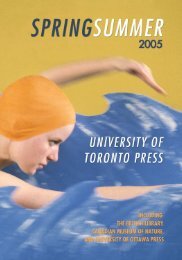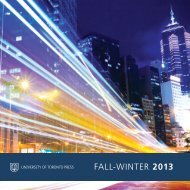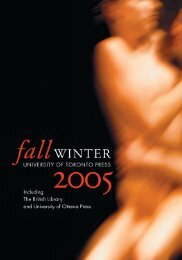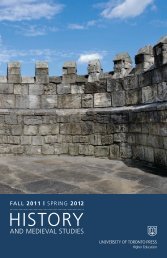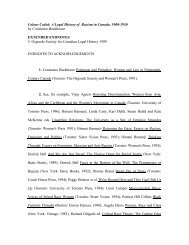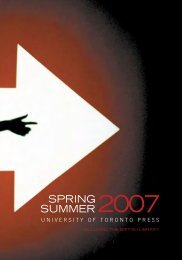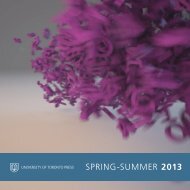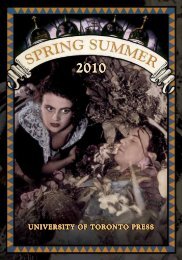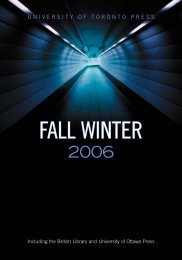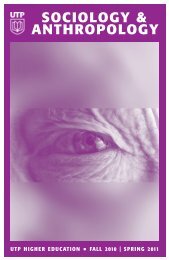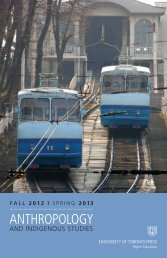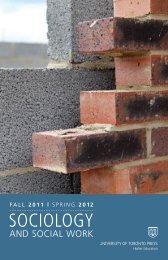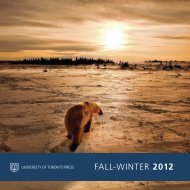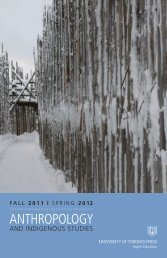Classics, Medieval & Renaissance 2012 - University of Toronto ...
Classics, Medieval & Renaissance 2012 - University of Toronto ...
Classics, Medieval & Renaissance 2012 - University of Toronto ...
Create successful ePaper yourself
Turn your PDF publications into a flip-book with our unique Google optimized e-Paper software.
LITERATURE<br />
Looking into Providences<br />
Designs and Trials in Paradise Lost<br />
NEW<br />
Raymond B. Waddington<br />
What is the role <strong>of</strong> providence in Paradise Lost In<br />
Looking into Providences, Raymond B. Waddington<br />
provides the first examination <strong>of</strong> this engaging<br />
subject. He explores the variety <strong>of</strong> implicit organizational<br />
structures or ‘designs’ that govern Paradise<br />
Lost, and looks in-depth at the ‘trials,’ or testing<br />
situations, which require interpretation, choice, and<br />
action from its characters.<br />
Waddington situates the poem within the context<br />
<strong>of</strong> providentialism’s centrality to seventeenth-century<br />
thought and life, arguing that Milton’s own conception<br />
<strong>of</strong> providence was deeply influenced by the theology<br />
<strong>of</strong> Jacob Arminius. Using Milton’s Arminian conception<br />
<strong>of</strong> free will, he then looks at the providential trials<br />
experienced by angels and humans. Finally, the<br />
work explores the ways in which providentialism<br />
infiltrates various kinds <strong>of</strong> discourse, ranging from<br />
military to medical, and from political to philosophical.<br />
Raymond B. Waddington is a pr<strong>of</strong>essor emeritus<br />
in the Department <strong>of</strong> English at the <strong>University</strong> <strong>of</strong><br />
California, Davis.<br />
Approx. 312 pp / 10 illustrations / 6 x 9 / September <strong>2012</strong><br />
Cloth 978-1-4426-4342-0 $65.00 (£45.99)<br />
Milton and Questions <strong>of</strong> History<br />
Essays by Canadians Past and Present<br />
NEW<br />
Edited by Feisal G. Mohamed and Mary Nyquist<br />
Milton and Questions <strong>of</strong> History considers the contribution<br />
<strong>of</strong> several classic studies <strong>of</strong> Milton written by<br />
Canadians in the twentieth century. It contemplates<br />
whether these might be termed a coherent ‘school’<br />
<strong>of</strong> Milton studies in Canada and it explores how<br />
these concerns might intervene in current critical and<br />
scholarly debates on Milton and, more broadly, on<br />
historicist criticism in its relationship to renewed<br />
interest in literary form.<br />
The volume opens with a selection <strong>of</strong> seminal<br />
articles by noted scholars including Northrop Frye,<br />
Hugh McCallum, Douglas Bush, Ernest Sirluck, and<br />
A.S.P. Woodhouse. Subsequent essays engage and<br />
contextualize these works while incorporating fresh<br />
intellectual concerns. The Introduction and Afterword<br />
frame the contents so that they constitute a<br />
dialogue between past and present critical studies<br />
<strong>of</strong> Milton by Canadian scholars.<br />
Feisal G. Mohamed is an associate pr<strong>of</strong>essor in the<br />
Department <strong>of</strong> English at the <strong>University</strong> <strong>of</strong> Illinois.<br />
Mary Nyquist is a pr<strong>of</strong>essor in the Department <strong>of</strong><br />
English at the <strong>University</strong> <strong>of</strong> <strong>Toronto</strong>.<br />
Approx. 424 pp / 6 x 9 / June <strong>2012</strong><br />
Cloth 978-1-4426-4392-5 $75.00 (£50.99)<br />
Spenser’s Ruins and the Art <strong>of</strong> Recollection<br />
NEW<br />
Rebeca Helfer<br />
What is the art <strong>of</strong> memory Rebeca Helfer’s intertextual<br />
study Spenser’s Ruins and the Art <strong>of</strong> Recollection<br />
<strong>of</strong>fers a fresh perspective on the significance <strong>of</strong> this<br />
ancient mnemonic technique to Edmund Spenser’s<br />
writing and, through this lens, explores the art’s<br />
complex historical and literary reception.<br />
Beginning with the origins <strong>of</strong> mnemonic strategies<br />
in epic tales, Helfer examines how the art <strong>of</strong> memory<br />
speaks to debates about poetry and its place in<br />
culture from Plato to Spenser’s present day. As Helfer<br />
argues, ruins provide memorial spaces for an ongoing<br />
dialogue about how story relates to history, and<br />
how both relate to edification and empire-building.<br />
Through detailed, intertextual readings <strong>of</strong> The<br />
Shepheardes Calender, The Faerie Queene, the<br />
Complaints, and other Spenserian works, Helfer<br />
demonstrates how the art <strong>of</strong> memory shapes<br />
Spenser’s theory and practice <strong>of</strong> poetry as well as<br />
his political view, throughout his career. More<br />
broadly, Spenser’s Ruins and the Art <strong>of</strong> Recollection<br />
points to new ways <strong>of</strong> understanding the importance<br />
<strong>of</strong> this art within literary studies.<br />
Rebeca Helfer is an associate pr<strong>of</strong>essor in the<br />
Department <strong>of</strong> English at the <strong>University</strong> <strong>of</strong> California,<br />
Irvine.<br />
Approx. 360 pp / 6 x 9 / June <strong>2012</strong><br />
Cloth 978-0-8020-9067-6 $85.00 (£57.99)<br />
utppublishing.com 25



